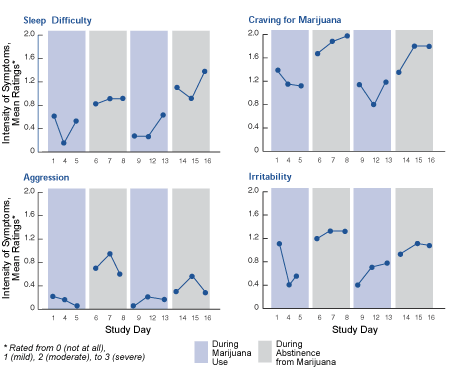Animal research and controlled studies of marijuana smokers during inpatient treatment suggest that marijuana dependence, like dependence on other addictive drugs, is associated with withdrawal symptoms -- such as irritability, anger, depressed mood, headaches, restlessness, lack of appetite, and craving -- that can make it difficult to stop using the drug.
Now, NIDA-supported research conducted by Dr. Alan Budney and colleagues at the University of Vermont in Burlington has found that marijuana smokers who stop using the drug while in their home environment suffer withdrawal symptoms that appear as severe as those associated with tobacco-smoking.
 Severity of Symptoms During Marijuana Use Versus Abstinence. Marijuana smokers living at home reported "clinically significant" withdrawal symptoms -- such as sleep difficulty, marijuana craving, aggression, and irritability -- during periods of abstinence from the drug. The participants' self-reports were confirmed, in part, by observers who reported increased restlessness and irritability among the marijuana users when they were not smoking.
Severity of Symptoms During Marijuana Use Versus Abstinence. Marijuana smokers living at home reported "clinically significant" withdrawal symptoms -- such as sleep difficulty, marijuana craving, aggression, and irritability -- during periods of abstinence from the drug. The participants' self-reports were confirmed, in part, by observers who reported increased restlessness and irritability among the marijuana users when they were not smoking."These findings represent a significant step toward general acceptance of withdrawal as a key aspect of chronic marijuana use," says Dr. Jag Khalsa of NIDA's Center on AIDS and Other Medical Consequences of Drug Abuse. Treatment providers may not address the problem of marijuana withdrawal because the condition is not currently included in the Diagnostic and Statistical Manual of Mental Disorders, Fourth Edition (DSM-IV), the standard reference published by the American Psychiatric Association.
Dr. Budney and his colleagues evaluated withdrawal symptoms in 12 adult marijuana smokers (7 male, 5 female, average age 30 years) over 3-day abstinence periods that followed 5-day periods when participants could smoke marijuana at will. "We found consistent emotional and behavioral symptoms that increased during abstinence and dramatically decreased when marijuana smoking resumed, suggesting that these types of symptoms are the hallmark of acute marijuana withdrawal," Dr. Budney says. "The symptoms most closely resembled many of those observed during nicotine withdrawal."
During the study, participants lived at home and made daily records rating the intensity of withdrawal symptoms (on a scale from 0, "not at all," to 3, "severe") over the preceding 24 hours. In addition, each participant designated an observer -- a friend or family member who spent at least 2 hours each day with the participant -- to provide an independent rating of the participant's withdrawal symptoms. The participants made daily laboratory visits during which their abstinence was confirmed by urine tests.
During the abstinence periods, participants reported increases in the severity of craving and sleep difficulty, decreased appetite, and increased aggression, anger, and irritability. In addition, participants reported an increase in "strange dreams" during the second abstinence period. Observers reported increased irritability and restlessness among the participants during abstinence.
"Marijuana withdrawal doesn't include dramatic physical symptoms such as the pain, nausea, heavy sweating, and cramps associated with opiate withdrawal. Nevertheless, the symptoms of marijuana withdrawal appear clinically significant. It seems clear now that withdrawal from marijuana produces identifiable behavioral and emotional distress that may be as important as, if not more important than, physical symptoms in the development of dependence and undermining attempts to quit using the drug," Dr. Budney says.
"Confirming withdrawal as part of marijuana dependence will increase the likelihood that treatment providers will alert patients to its symptoms and will help them cope with it through behavioral or pharmacological treatments," says Dr. Khalsa.
Source
- Budney, A.J.; Hughes, J.R.; Moore, B.A.; Novy, P.L. Marijuana abstinence effects in marijuana smokers maintained in their home environment. Archives of General Psychiatry 58(10):917-924, 2001.
